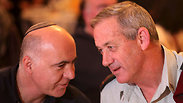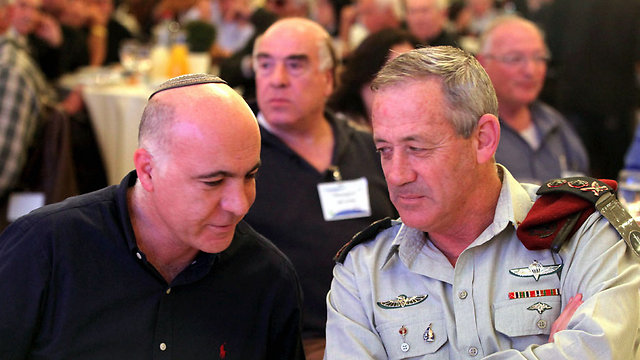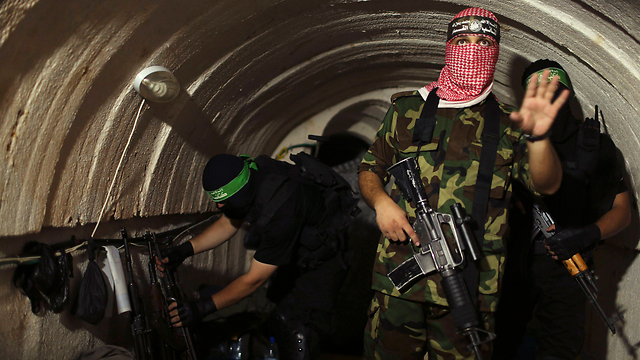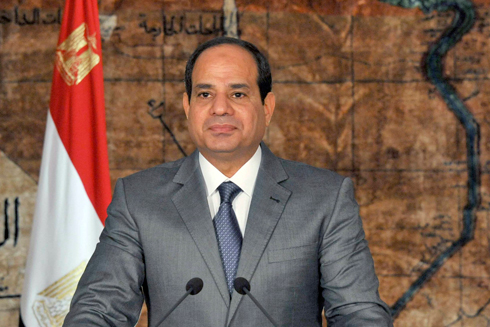
IDF-Shin Bet relations: From partners to bitter rivals
Analysis: The relationship between Israel's security organizations has experienced ups and downs over the years and affected their cooperation. The IDF chief's letter of complaint against the Shin Bet head brought the rift out in the open and requires the prime minister to make a clear decision.
Now, the rift between the two security organizations has become public, it's tainting the atmosphere and requires a clear decision by the prime minister.
In a letter he sent to Benjamin Netanyahu, IDF Chief of Staff Benny Gantz is essentially demanding that the prime minister, who is the political figure in charge of the Shin Bet and its head, call Shin Ben chief Yoram Cohen to order and even reprimand him for violating the rules of discussion within the defense establishment and exposing security-related secrets.
The fact that the Shin Bet director permitted active members of the organization, including one of its senior officials, the head of the southern district, to give an interview, is a serious violation of the rules and even harms information security.

The IDF and Shin Bet have had serious differences of opinion, mainly over the areas of responsibility of the Military Intelligence Directorate. Sometimes, the Shin Bet would demand to operate and would even operate in the same intelligence professional areas or in the same geographic areas.
In one case, there was a dispute over who was responsible for intelligence in Gaza after the Oslo Agreements and after the IDF pulled out of most of the Palestinian population centers in the Strip. The prime minister eventually decided that it falls in the Shin Bet's area of responsibility.
There were differences of opinion over the activity in Lebanon too. A main disagreement was whether the Shin Bet should have an electronic intelligence service like the Military Intelligence Directorate's Unit 8200.
These disputes often led to loud scuffles, but the bitter rivals in the IDF and Shin Bet never let this feud get out, and the censorship strictly prevented us journalists from reporting about it.
Nonetheless, throughout the decades that this dispute has been going on, I can't remember a single event or incident in which the chief of staff, the prime minister and the Shin Bet head were involved in a loud argument, exchanging such serious accusations.
The Shin Bet is basically arguing that the IDF, and the prime minister too probably, ignored the Shin Bet's warning of an impending war, as well as the General security Service's demand that they take action against Hamas' offensive tunnels, which the Shin Bet claims to have discovered.
Officials in the Military Intelligence Directorate are claiming, however, that it was a joint team which discovered the tunnels.

In all the years of dispute, Israel's security was ultimately never affected, but the disagreements led to duplications in the security coverage and damaged the cooperation.
When loving marriage turns into loud scuffle
In order to overcome these differences, attempts were made during previous IDF chiefs' terms and during the term of former Military Intelligence head Amos Malka in the 1990s to compose a document which defines the exact areas of responsibility of each organization, both geographically and in terms of professional areas.
The document, called "Magna Carta," like the charter signed between the king of England and his people which led to the establishment of the parliamentarian democracy in the kingdom, stated that Unit 8200 would provide electronic intelligence services to the Shin Bet, and that is indeed the case.
The intelligence "Magna Carta" reduced the flames of dispute, but did not put out the fire completely. In the past few years, particularly following the second intifada and Operation Defensive Shield, the disagreements essentially disappeared. The Mossad, the Shin Bet and the Military Intelligence Directorate worked in remarkable cooperation.
This cooperation allowed the organization to solve intelligence issues rapidly and carry out targeted assassinations in an unusual collaboration and in an atmosphere which someone defined at the time as a loving marriage between the Shin Bet and Military Intelligence Directorate.
That period apparently came to an end with the loud scuffle that broke out Wednesday over whether the Shin Bet had warned about an expected escalation in Gaza in the summer.
Gantz in April: Prepare for Gaza conflict in July
In April 2014, after a General Staff evaluation of the situation, Lieutenant-General Gantz instructed the IDF's command chiefs and heads of its military wings to prepare for a conflict in the Gaza Strip as a result of a possible escalation in the summer.
The chief of staff said the army must be ready and prepared for a major battle in Gaza, including a ground invasion, in the beginning of July.
The IDF chief explained that Hamas was experiencing increasing economic distress and political isolation as a result of its severed ties with Iran, the destruction of smuggling tunnels on the Philadelphi Route by Egyptian President Abdel Fattah al-Sisi's regime and the Egyptian closure of the Rafah Border Crossing.

Gantz further noted that the Hamas government workers and security organization members had not received their salaries and that Israel and the Palestinian Authority were preventing the payments.
As a result, the IDF chief said, Hamas may open fire in the summer, although it had refrained from firing into Israel since Operation Pillar of Defense and had prevented rebellious Palestinian organizations from doing so.
Gantz did not mention any warning provided by the Shin Bet in January.
General Staff officials say, however that the Shin Bet did provide a warning in early 2014 about the offensive tunnels reaching Israel, and that a joint Shin Bet-Intelligence Directorate team was established and located more than 30 tunnels in their excavation process.
IDF officials add that the Shin Bet provided valuable information during the fighting which saved fighters' lives and significantly improved the results of the battle.
'Some people have an interest in creating a dispute'
Sources associated with the Shin Bet said in response to the chief of staff's letter to the prime minister that none of the General Security Service's members said in Channel 2 "Uvda" program, or in any other forum, that the Shin Bet had warned of a war in January.
According to the sources, the officials simply said that the organization has received initial information about Hamas training for a battle, but that the information was weak and did not justify warning of a war.
The same sources add that in April the organization issued a warning of a strategic mega-attack Hamas was planning to execute through the tunnel, including targeting communities and kidnapping.
The sources further stress that none of the Shin Bet officials who were interviewed on the program criticized the IDF, but quite the opposite. According to the source, the officials praised the IDF's performance before and during Operation Protective Edge, but those praises were edited out of the show.
The security sources say their only intention was to stress the Shin Bet's achievements before and during the operation, and that they had no intention of belittling the part played by the IDF and Military Intelligence Directorate.
In addition, the General Security Service sources say, not a word was said in the program about the assassination of Hamas commander Mohammed Deif.
"This issue is being inflamed unnecessarily. It's possible that there are people in the IDF and perhaps in the media who have an interest in creating a dispute," one of the sources says.
A knowledgeable source who was present at the cabinet meeting says the exchange of accusations between then-Military Directorate chief Aviv Kochavi and Shin Bet head Yoram Cohen seemed more like a war between egos than a real dispute over facts.
In any event, the sources denied Channel 2's claim that the Shin Bet had provided a warning of a war in Gaza in January.










